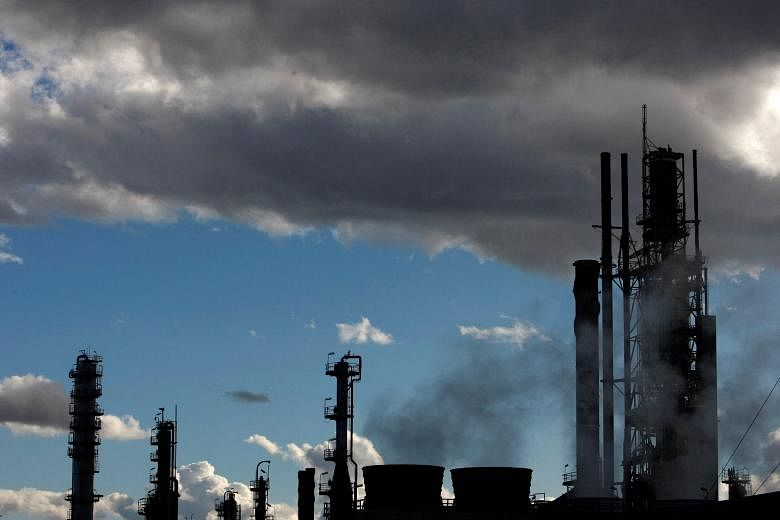NEW YORK (BLOOMBERG) - Calls to end fossil fuel investments seem to come from just about everywhere - Harvard University, the Vatican and big philanthropies like the Ford Foundation.
So it might be a surprise that some of the world's biggest money managers have adopted the exact opposite line.
To save the planet, they say, do not dump those holdings.
At a time when the financial world is talking up environmental, social and governance (ESG) issues, industry heavyweights such as BlackRock, Brookfield Infrastructure Partners and M&G Investments are questioning the real-world value of divesting from oil and gas.
Their argument? That shareholders, not outsiders, are best positioned to bring about change from within and push corporate polluters to clean up and transition to a low-carbon future.
"Divestment doesn't reduce greenhouse gases," said Mr Christopher Ailman, chief investment officer (CIO) of the California State Teachers' Retirement System (Calstrs), which managed almost US$330 billion (S$444 billion) at the end of last year.
"The more we make it a fight, the more we're going to see a rebellion on the other side."
It all might sound a bit convenient given oil and gas stocks have been on a tear. The S&P 500 Energy Index has surged 26 per cent this year as at Friday, the best performance of any industry by far, led by Occidental Petroleum's 48 per cent gain.
And with oil at US$100 a barrel on the horizon, there could be even more money to be made by investing in fossil fuels.
Calls for divestment grew louder last year. There were 1,485 institutions with US$39 trillion of assets publicly committed to some form of divestment from fossil fuels in 2021, up from 181 institutions with US$52 billion in 2014, according to one tally by a coalition of environmental and consumer advocacy organisations.
The New York State Common Retirement Fund was one of the latest to commit, announcing on Feb 9 that it would divest US$238 million from 21 energy firms, including Chesapeake Energy and Diamondback Energy.
Morality is one thing - whether divestment actually works is another.
It can encourage a company to respond to criticism, but whenever one money manager sells a stake, it may be purchased by another investor who is not interested in pressing management on ESG grounds.
Mr Rupert Krefting, head of corporate finance and stewardship at M&G Investments in London, scours the firm's exposure to the biggest emitters and then discusses strategy with its portfolio managers.
While M&G is considering criteria for divesting from coal, it sees oil and gas as critical parts of the climate transition.
"Divestment is the last resort," he said in an interview.
That is a view shared by Ms Johanna Kyrklund, CIO of London-based Schroders, which manages about US$1 trillion.
The company is not going down "the path of exclusion", she said, which would be tantamount to "undermining the portfolio".
"Active ownership is a better way forward, and that is what we have been doing," she added.
Calstrs showed the benefits of remaining invested in oil and gas. It supported the Engine No. 1 activist campaign that succeeded in replacing a quarter of Exxon Mobil's board last year.
Since the effort began, the oil giant has toughened its pollution targets, declared an ambition to eliminate emissions from its operations by 2050 and created a new division for low-carbon investments.
The current energy supply crunch - with surging heating and gas prices - is a cautionary tale about what a disorderly climate transition might look like when there is not enough production from renewable sources to meet global demand, according to BlackRock, the world's biggest asset manager.
BlackRock, which oversees US$10 trillion, including more than US$500 billion in sustainable funds, has said it does not have a divestment policy for oil and gas.
Instead, senior executives recently told clients that investing in companies with decarbonisation plans is an "under-appreciated opportunity", especially during the early years of what is expected to be a decades-long climate transition.
Last year, Toronto-based Brookfield Infrastructure completed the acquisition of Inter Pipeline, which operates energy infrastructure assets across Western Canada.
The firm, a publicly traded subsidiary of Brookfield Asset Management, is targeting the midstream part of the petroleum industry that handles fuel storage, processing and transport.
"We'll see a number of opportunities surface there as this sector becomes under-invested due to the ESG winds," Brookfield Infrastructure chief executive Sam Pollock said on a conference call with analysts earlier this month.
Brookfield Asset Management, meanwhile, is in the final stages of closing its US$15 billion transition fund, CEO Bruce Flatt said in a letter to shareholders on Feb 10.
"This fund was raised faster, and is larger, than expected, and we have already started putting the capital to work to help companies decarbonise their operations," he wrote.
"However, a critical point in this is that everything does not have to become green today - in fact, not everything can be green today."

